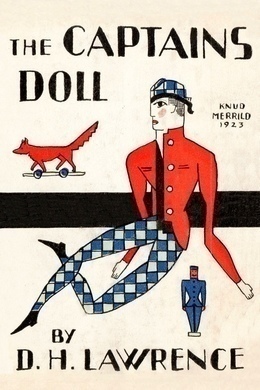
-
EPUB 175 KB
-
Kindle 208 KB
-
Support epubBooks by making a small $2.99 PayPal donation purchase.
Description
Set during World War I, a married Scottish soldier, instead of returning home, courts a displaced German countess in occupied Germany. The narrative revolves around a relationship that is not condoned by the society. The complexities of a love that is not reciprocated and whose boundaries are not defined. D. H. Lawrence’s fascinating novella deala with the dehumanising effects of war on an English captain.
129 pages with a reading time of ~2 hours (32298 words), and first published in 1923. This DRM-Free edition published by epubBooks, 2014.
Community Reviews
There are currently no other reviews for this book.
Excerpt
‘Hannele!’
‘Ja–a.’
‘Wo bist du?’
‘Hier.’
‘Wo dann?’
Hannele did not lift her head from her work. She sat in a low chair under a reading-lamp, a basket of coloured silk pieces beside her, and in her hands a doll, or mannikin, which she was dressing. She was doing something to the knee of the mannikin, so that the poor little gentleman flourished head downwards with arms wildly tossed out. And it was not at all seemly, because the doll was a Scotch soldier in tight-fitting tartan trews.
There was a tap at the door, and the same voice, a woman’s, calling:
‘Hannele?’
‘Ja–a!’
‘Are you here? Are you alone?’ asked the voice in German.
‘Yes–come in.’
Hannele did not sound very encouraging. She turned round her doll as the door opened, and straightened his coat. A dark-eyed young woman peeped in through the door, with a roguish coyness. She was dressed fashionably for the street, in a thick cape-wrap, and a little black hat pulled down to her ears.
‘Quite, quite alone!’ said the newcomer, in a tone of wonder. ‘Where is he, then?’
‘That I don’t know,’ said Hannele.
‘And you sit here alone and wait for him? But no! That I call courage! Aren’t you afraid?’ Mitchka strolled across to her friend.
‘Why shall I be afraid?’ said Hannele curtly.
‘But no! And what are you doing? Another puppet! He is a good one, though! Ha–ha–ha! HIM! It is him! No–no–that is too beautiful! No–that is too beautiful, Hannele. It is him–exactly him. Only the trousers.’
‘He wears those trousers too,’ said Hannele, standing her doll on her knee. It was a perfect portrait of an officer of a Scottish regiment, slender, delicately made, with a slight, elegant stoop of the shoulders and close-fitting tartan trousers. The face was beautifully modelled, and a wonderful portrait, dark-skinned, with a little, close-cut, dark moustache, and wide-open dark eyes, and that air of aloofness and perfect diffidence which marks an officer and a gentleman.
Mitchka bent forward, studying the doll. She was a handsome woman with a warm, dark golden skin and clear black eyebrows over her russet-brown eyes.
‘No,’ she whispered to herself, as if awe-struck. ‘That is him. That is him. Only not the trousers. Beautiful, though, the trousers. Has he really such beautiful fine legs?’
Hannele did not answer.
‘Exactly him. Just as finished as he is. Just as complete. He is just like that: finished off. Has he seen it?’
‘No,’ said Hannele.
‘What will he say, then?’ She started. Her quick ear had caught a sound on the stone stairs. A look of fear came to her face. She flew to the door and out of the room, closing the door to behind her.
‘Who is it?’ her voice was heard calling anxiously down the stairs.
The answer came in German. Mitchka immediately opened the door again and came back to join Hannele.
‘Only Martin,’ she said.
She stood waiting. A man appeared in the doorway–erect, military.
‘Ah! Countess Hannele,’ he said in his quick, precise way, as he stood on the threshold in the distance. ‘May one come in?’
‘Yes, come in,’ said Hannele.
The man entered with a quick, military step, bowed, and kissed the hand of the woman who was sewing the doll. Then, much more intimately, he touched Mitchka’s hands with his lips.
Mitchka meanwhile was glancing round the room. It was a very large attic, with the ceiling sloping and then bending in two handsome movements towards the walls. The light from the dark-shaded reading-lamp fell softly on the huge whitewashed vaulting of the ceiling, on the various objects round the walls, and made a brilliant pool of colour where Hannele sat in her soft, red dress, with her basket of silks.
She was a fair woman with dark-blond hair and a beautiful fine skin. Her face seemed luminous, a certain quick gleam of life about it as she looked up at the man. He was handsome, clean- shaven, with very blue eyes strained a little too wide. One could see the war in his face.
Mitchka was wandering round the room, looking at everything, and saying: ‘Beautiful! But beautiful! Such good taste! A man, and such good taste! No, they don’t need a woman. No, look here, Martin, the Captain Hepburn has arranged all this room himself. Here you have the man. Do you see? So simple, yet so elegant. He needs a woman.’
The room was really beautiful, spacious, pale, soft-lighted. It was heated by a large stove of dark-blue tiles, and had very little furniture save large peasant cupboards or presses of painted wood, and a huge writing-table, on which were writing materials and some scientific apparatus and a cactus plant with fine scarlet blossoms. But it was a man’s room. Tobacco and pipes were on a little tray, on the pegs in the distance hung military overcoats and belts, and two guns on a bracket. Then there were two telescopes, one mounted on a stand near a window. Various astronomical apparatus lay upon the table.
